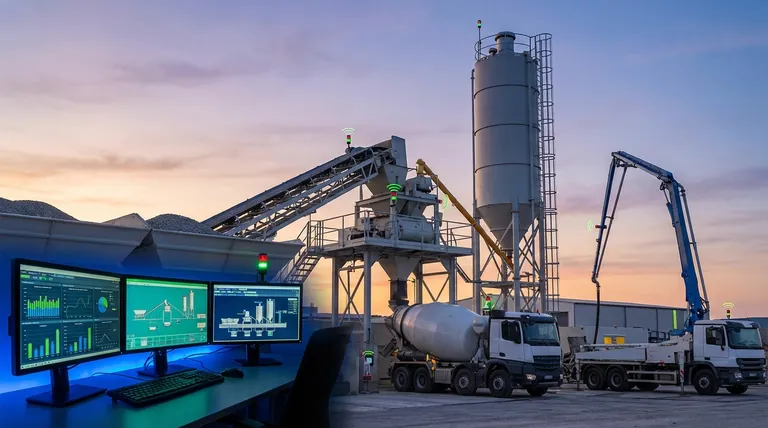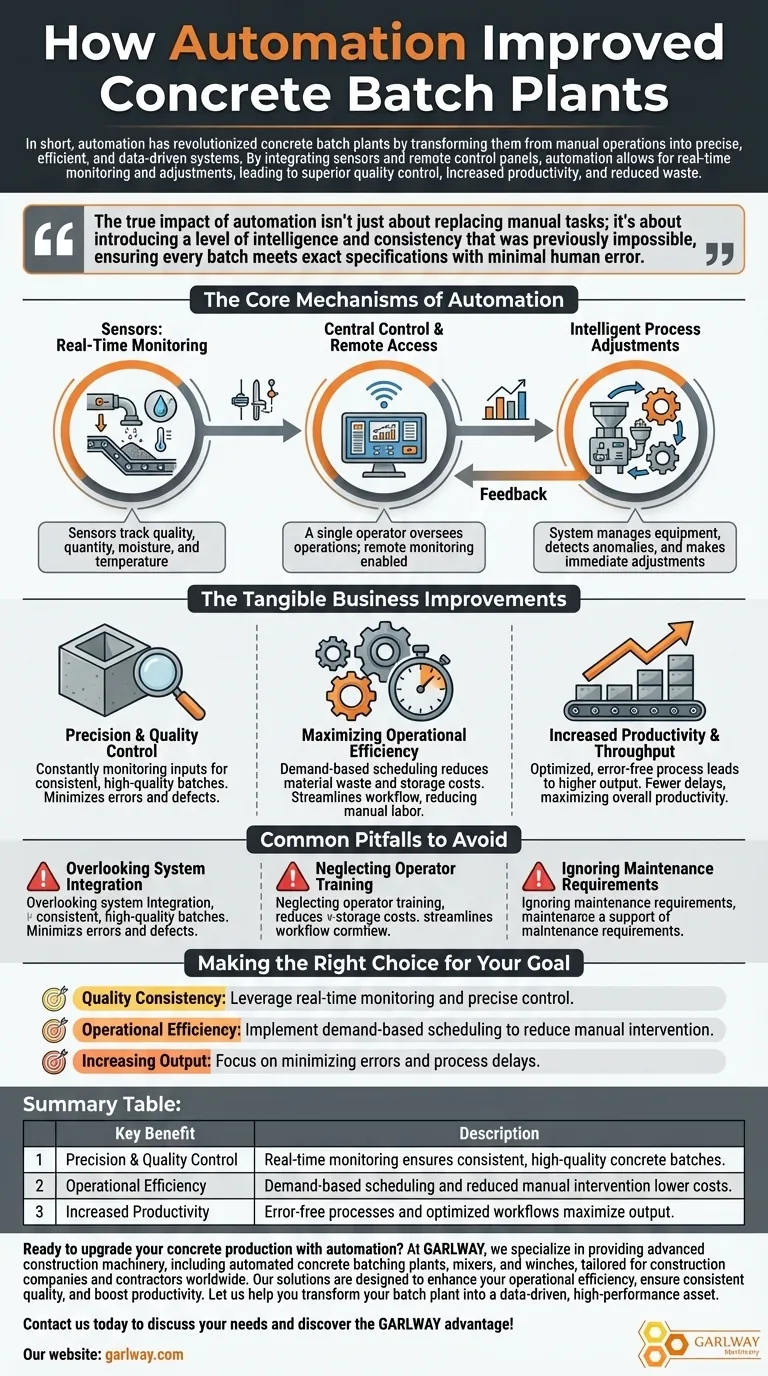In short, automation has revolutionized concrete batch plants by transforming them from manual operations into precise, efficient, and data-driven systems. By integrating sensors and remote control panels, automation allows for real-time monitoring and adjustments, leading to superior quality control, increased productivity, and reduced waste.
The true impact of automation isn't just about replacing manual tasks; it's about introducing a level of intelligence and consistency that was previously impossible, ensuring every batch meets exact specifications with minimal human error.

The Core Mechanisms of Automation
Automation works by creating a feedback loop between the physical machinery and a central control system. This system uses real-time data to make intelligent decisions that optimize the entire production process.
Real-Time Monitoring with Sensors
Sensors are the eyes and ears of an automated plant. They are placed throughout the system to continuously monitor critical variables.
This includes tracking the quality and quantity of raw materials like aggregate and cement, as well as monitoring batch conditions such as moisture content and temperature in real-time.
Centralized and Remote Control
All this sensor data feeds into a central control panel. This allows a single operator to oversee the entire plant's operations.
Furthermore, these systems often enable remote control, giving managers the ability to monitor production and make adjustments from anywhere, ensuring continuous and efficient operation.
Intelligent Process Adjustments
The system uses the incoming data to automatically manage equipment like concrete pumps, mixers, and screeds.
If a sensor detects an anomaly, the system can make immediate process adjustments, preventing defects before they happen and drastically reducing the need for manual checks and corrections.
The Tangible Business Improvements
Implementing automation isn't just a technical upgrade; it delivers significant, measurable benefits to the business by improving quality, efficiency, and overall productivity.
Unprecedented Precision and Quality Control
By constantly monitoring inputs and conditions, automation ensures that every single batch of concrete is produced to the exact same high standard.
This minimizes errors and defects, leading to a more reliable and valuable final product, which is critical for meeting stringent project specifications.
Maximizing Operational Efficiency
Automation enables demand-based production scheduling. The plant can produce exactly what is needed, when it's needed, reducing material waste and storage costs.
By eliminating many manual intervention points, automation also streamlines the workflow, freeing up personnel for higher-value tasks and reducing labor costs.
Increased Productivity and Throughput
An optimized, error-free process naturally leads to higher output. With fewer delays from manual checks or correcting defective batches, the plant can achieve a much higher level of overall productivity.
Common Pitfalls to Avoid
While the benefits are clear, a successful transition to automation requires a strategic approach. It is not simply a "plug-and-play" solution.
Overlooking System Integration
A common mistake is failing to ensure all components—from sensors to mixers to the control software—can communicate seamlessly. Poor integration can create new bottlenecks and negate the potential efficiency gains.
Neglecting Operator Training
The role of the plant operator shifts from manual labor to system oversight. Without proper training on the new control panels and software, the team cannot leverage the full power of the automated system.
Ignoring Maintenance Requirements
Automated systems, with their complex sensors and electronics, require a different kind of maintenance than purely mechanical equipment. A proactive maintenance plan is essential to prevent costly downtime.
Making the Right Choice for Your Goal
Adopting automation should be aligned with your specific operational priorities.
- If your primary focus is quality consistency: Leverage automation for its real-time monitoring and precise control over material inputs and mixing conditions.
- If your primary focus is operational efficiency: The ability to implement demand-based scheduling and reduce manual intervention will deliver the most significant return.
- If your primary focus is increasing output: Focus on how automation minimizes errors and process delays to maximize the plant's overall throughput.
Ultimately, automation empowers a concrete batch plant to operate with data-driven precision, transforming it into a highly reliable and productive asset.
Summary Table:
| Key Benefit | Description |
|---|---|
| Precision & Quality Control | Real-time monitoring ensures consistent, high-quality concrete batches. |
| Operational Efficiency | Demand-based scheduling and reduced manual intervention lower costs. |
| Increased Productivity | Error-free processes and optimized workflows maximize output. |
Ready to upgrade your concrete production with automation?
At GARLWAY, we specialize in providing advanced construction machinery, including automated concrete batching plants, mixers, and winches, tailored for construction companies and contractors worldwide. Our solutions are designed to enhance your operational efficiency, ensure consistent quality, and boost productivity.
Let us help you transform your batch plant into a data-driven, high-performance asset. Contact us today to discuss your needs and discover the GARLWAY advantage!
Visual Guide

People Also Ask
- What is the function of the air compressor in a concrete batch plant? The Power Behind Automated Batching
- How can the strength of concrete be adjusted when the cement strength changes? Master the Water-Cement Ratio
- What should be inspected in the installation of a concrete mixing plant? Ensure Safe, High-Quality Production
- How can the number of transport vehicles be determined for a commercial concrete plant? Optimize Fleet Size for Efficiency
- What should be considered in the configuration selection of a concrete batching plant? Optimize Your Plant for Cost & Efficiency
- Why is the quality of raw materials important for concrete production? Ensure Structural Integrity & Durability
- Why is the design of a concrete mixing plant important? Unlock Efficiency, Quality, and Profitability
- What are the daily maintenance tasks for a concrete batching machine? Ensure Plant Uptime & Batch Accuracy